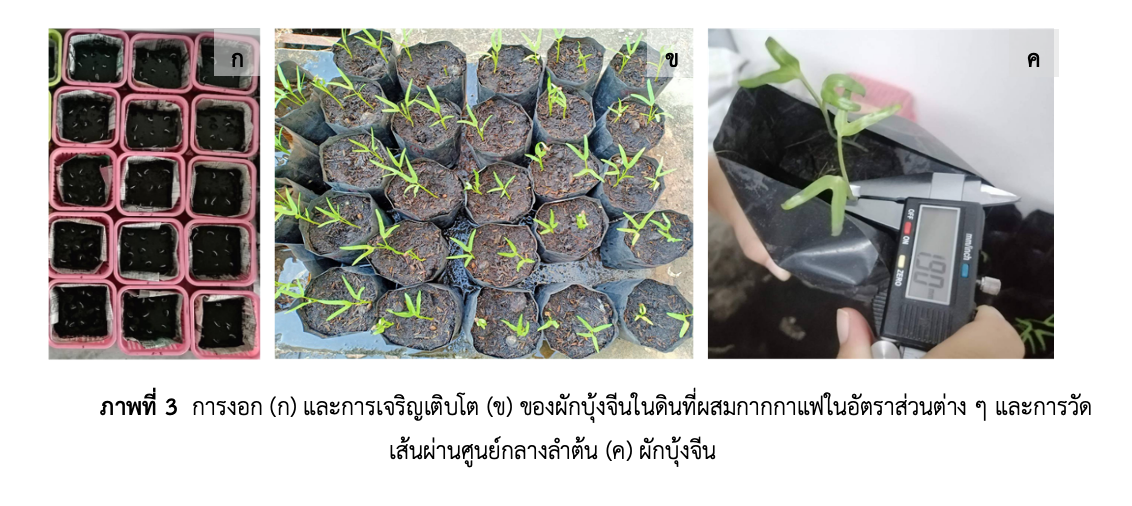ผลของดินผสมกากกาแฟต่อการงอกและการเจริญเติบโตของต้นกล้าผักบุ้งจีน
Main Article Content
บทคัดย่อ
ผักบุ้งจีนเป็นผักเศรษฐกิจที่บริโภคกันอย่างแพร่หลายและมีคุณค่าทางอาหารสูง เมื่อกระแสความนิยมผักปลอดภัยและผักอินทรีย์มีมากขึ้น กากกาแฟจึงเป็นอีกหนึ่งทางเลือกที่จะนำมาใช้เป็นส่วนหนึ่งของวัสดุปลูก เนื่องจากมีส่วนประกอบของธาตุอาหารพืชที่อาจช่วยในการเติบโตของผักบุ้งจีนได้ การทดลองนี้ได้ศึกษาผลของดินผสมกากกาแฟในอัตราส่วนต่าง ๆ ต่อการงอกและการเจริญเติบโตของผักบุ้งจีน โดยพบว่าเปอร์เซ็นต์การงอกเมล็ดผักบุ้งจีนไม่แตกต่างกันเมื่อเพาะในดินที่มีกากกาแฟผสม 0 5 10 15 และ 20% แต่ดินที่มีกากกาแฟผสม 5 10 และ 15% ส่งเสริมเวลาเฉลี่ยในการงอกและดัชนีการงอกได้ หลังการปลูก 2 สัปดาห์ ผักบุ้งจีนที่ปลูกด้วยดินผสมกากกาแฟ 5% มีเส้นผ่านศูนย์กลางลำต้น ความยาวลำต้น และจำนวนใบมากกว่าที่ปลูกด้วย 15 และ 20% และหลังการปลูก 4 สัปดาห์ น้ำหนักสดและน้ำหนักแห้งของผักบุ้งจีนแต่ละทรีตเมนต์ไม่แตกต่างกัน แต่พบว่าผักบุ้งจีนที่ปลูกดินที่ผสมกากกาแฟ 0 5 และ 10% มีจำนวนรากมากกว่าที่ปลูกในดินที่ผสมกากกาแฟ 15 และ 20% ส่วน pH ทุกทรีตเมนต์มีค่าเพิ่มขึ้น ดังนั้นการผสมกากกาแฟไปในดินในอัตราส่วนที่เหมาะสมอาจเป็นวัสดุปลูกทางเลือกหนึ่งที่จะใช้ส่งเสริมการเจริญเติบโตของพืชได้
Article Details
วารสารวิทยาศาสตร์และวิทยาศาสตร์ศึกษา (JSSE) เป็นผู้ถือลิสิทธิ์บทความทุกบทความที่เผยแพร่ใน JSSE นี้ ทั้งนี้ ผู้เขียนจะต้องส่งแบบโอนลิขสิทธิ์บทความฉบับที่มีรายมือชื่อของผู้เขียนหลักหรือผู้ที่ได้รับมอบอำนาจแทนผู้เขียนทุกนให้กับ JSSE ก่อนที่บทความจะมีการเผยแพร่ผ่านเว็บไซต์ของวารสาร
แบบโอนลิขสิทธิ์บทความ (Copyright Transfer Form)
ทางวารสาร JSSE ได้กำหนดให้มีการกรอกแบบโอนลิขสิทธิ์บทความให้ครบถ้วนและส่งมายังกองบรรณาธิการในข้อมูลเสริม (supplementary data) พร้อมกับนิพนธ์ต้นฉบับ (manuscript) ที่ส่งมาขอรับการตีพิมพ์ ทั้งนี้ ผู้เขียนหลัก (corresponding authors) หรือผู้รับมอบอำนาจ (ในฐานะตัวแทนของผู้เขียนทุกคน) สามารถดำเนินการโอนลิขสิทธิ์บทความแทนผู้เขียนทั้งหมดได้ ซึ่งสามารถอัพโหลดไฟล์บทความต้นฉบับ (Manuscript) และไฟล์แบบโอนลิขสิทธิ์บทความ (Copyright Transfer Form) ในเมนู “Upload Submission” ดังนี้
1. อัพโหลดไฟล์บทความต้นฉบับ (Manuscript) ในเมนูย่อย Article Component > Article Text
2. อัพโหลดไฟล์แบบโอนลิขสิทธิ์บทความ (Copyright Transfer Form) ในเมนูย่อย Article Component > Other
ดาวน์โหลด ไฟล์แบบโอนลิขสิทธิ์บทความ (Copyright Transfer Form)
เอกสารอ้างอิง
Adthalungrong, A. and Insung, L. (2015). Water Convolvulus Planting (in Thai). Horticulture Research Institute, Department of Agriculture.
Brunerová, A., Roubík, H., Brožek, M., Haryanto, A., Hasanudin, U., Iryani, D. A., and Herák, D. (2020). Valorization of bio-briquette fuel by using spent coffee ground as an external additive. Energies, 13(1), 54.
Campos-Vega, R., Loarca-Pina, G., Vergara-Castaneda, H. A., and Oomah, B. D. (2015). Spent coffee grounds: A review on current research and future prospects. Trends in Food Science & Technology, 45(1), 24-36.
Chaichan, W., Chaichan, W. and Sawain, A. (2017). Plant Pots from Co-Production of Spent Coffee Grounds, Shell Lime and Rubber Wood Sawdust (in Thai). Trang: Department of Environment, Faculty of Science and Fisheries Technology, Rajamangala University of Technology Srivijaya.
Chrysargyris, A., Antoniou, O., Xylia, P., Petropoulos, S., and Tzortzakis, N. (2020). The use of spent coffee grounds in growing media for the production of Brassica seedlings in nurseries. Environmental Science and Pollution Research, 28(19), 24279-24290
Chulaka, P., Kaewsorn, P. and Jeenprasom, P. (2014). Effect of growing media containing coffee ground on germination and growth of tomato seedling (Lycopersicon esculentum Mill.) (in Thai). Agricultural Science Journal, 45(2): 349-352.
Cruz, R., Baptista, P., Cunha, S., Pereira, J. A., and Casal, S. (2012). Carotenoids of lettuce (Lactuca sativa L.) grown on soil enriched with spent coffee grounds. Molecules, 17(2), 1535-1547.
Darnaudery, M., Fournier, P., and Lechaudel, M. (2018). Low-input pineapple crops with high quality fruit: promising impacts of locally integrated and organic fertilisation compared to chemical fertilisers. Experimental Agriculture, 54(2), 286-302.
Department of Land Development. (2010). Operating Manual Soil Chemical Analysis Process (in Thai). Bangkok: Department of Land Development.
Ellis, R. A. and Roberts, E.H. (1981). The quantification of ageing and survival in orthodox seeds. Seed Science and Technology, 9, 373-409.
Hardgrove, S. J., and Livesley, S. J. (2016). Applying spent coffee grounds directly to urban agriculture soils greatly reduces plant growth. Urban Forestry & Urban Greening, 18, 1-8.
International Seed Testing Association (ISTA). 2014. International Rules for Seed Testing. Brassersdorf, Switzerland: International Seed Testing Association.
Mussatto, S. I., Carneiro, L. M., Silva, J. P., Roberto, I. C., and Teixeira, J. A. (2011). A study on chemical constituents and sugars extraction from spent coffee grounds. Carbohydrate Polymers, 83(2), 368-374.
Nuanprom, S. (2005). Effect of seedling rates on yield standard of Chinese water spinach (in Thai). Special Problem Department of Horticultural Faculty of Agriculture at Kamphaeng Saen Kasetsart University.
Osuna, D., Prieto, P., and Aguilar, M. (2015). Control of seed germination and plant development by carbon and nitrogen availability. Frontiers in Plant Science, 6, 1-14.
Ronga, D., Pane, C., Zaccardelli, M., and Pecchioni, N. (2016). Use of spent coffee ground compost in peat-based growing media for the production of basil and tomato potting plants. Communications in Soil Science and Plant Analysis, 47(3), 356-368.
Saengngam, T., Bootpetch, S., and Hengcharoen A. (2020). Management of chemical fertilizers based on soil analysis with soil amendments to increase yield of water convolvulus (Ipomoea aquatica forsskal) in Pak Chong soil series (in Thai). Journal of Agricultural Science and Management, 2(3), 94-104
Steel, R. G. D. and Torrie, J. H. (1980). Principle and Procedure of Statistic. New York: MC Graw-Hill Book Company.
Wetchakama, N. and Khaengkhan, P. (2018). Improvement of seed qualities with seed priming techniques (in Thai). Prawarun Agricultural Journal, 15(1), 17-30.
Wilaiporn, S. (2019). Effect of aerobic compost and chemical fertilizers on water convolvulus yield (in Thai). Thai Agricultural Research Journal, 37(1), 48-57.
Yamane, K., Kono, M., Fukunaga, T., Iwai, K., Sekine, R., Watanabe, Y., and Iijima, M. (2014). Field evaluation of coffee grounds application for crop growth enhancement, weed control, and soil improvement. Plant Production Science, 17(1), 93-102.
Zhi, J.Z. (2000). Germination test. In Guideline for Agricultural Seed Testing Rules. (pp.43-51). Beijing: Standards Press of China.


